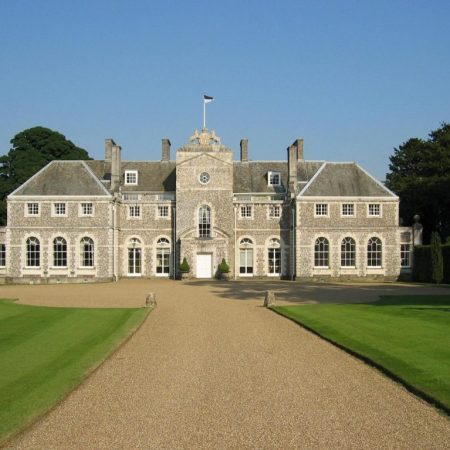The Wallop family, earls of Portsmouth, has been associated with Hampshire since at least Domesday. There are no less than four places in the county which contain the name of the family (a record?), as well as a part of the Thorngate Hundred, though the Wallops may, in fact, have derived their name from the villages.
The family seat at Farleigh Wallop, however, definitely took name from the family. Now a luxury let for the super-rich it was for centuries occupied by the family. Then in 1667 it burnt down, allegedly on the orders of the king as punishment for Robert Wallop’s siding with Parliament during the Civil War. Rebuilt in 1731, it was let for the next 200 years and the family moved to a vast mansion built on their estate at Hurstbourne Priors. It wasn’t until the 1920s that Farleigh Wallop was taken back by the 9th Earl, who had been raised in the USA.
More information on Farleigh Wallop and adjacent villages is available from a new Victoria County History ‘short’, namely, Cliddesden, Hatch and Farleigh Wallop by A. Deveson and S. Lane. (£16 inc. p & p), available from Dr J. Morrin, 23 West Road, Emsworth, PO10 7JT.
The personal papers of the Wallops survive – nearly 7,000 items in 200 boxes to be precise. And like so many other caches they provide a rich source for telling the story of the family. Also, they incidentally include information on the people who worked with them and for them.
According to an analysis by the Hampshire Archives Trust, thousands of family historians with more humble ancestors are missing valuable sources of information about their ancestors like those of the Wallops because they rely too much on online archives, This has highlighted the fact that some family studies could be dramatically extended by making greater use of physical records not yet available on line.
This is, indeed, the experience of expert Paul Pinhorne, Chairman of the Hampshire Genealogical Society, who commented: ‘Many on-line sites are just collections of transcription datasets, and family historians cannot see the actual record. My own experience of searching for ancestors in Farleigh Wallop allowed me to view and handle a bundle of parchment relating to the Wallops. I believe this is one of the best ways of finding out more about our ancestors than just dates of Baptisms, Marriages and Burials.’
Key venues for family researchers are the record offices in Winchester, Southampton and Portsmouth, which hold hundreds of thousands of documents deposited by influential families. The papers of the Wallop family are held by the Hampshire Record Office , together with the private archives of more than 70 other major families. They can generally be ordered in search rooms, though in some cases prior permission is required. A century or less ago, these grandees were employing large numbers of people, whose lives may be depicted in documents of all kinds.
The Wallop papers cover no less than 20 places in the county, equalled by another long-established and influential Hampshire family, the Paulets, Marquesses of Winchester and Dukes of Bolton. Some other collections are limited to smaller areas, like those of the Portal family of Laverstoke, papermakers, and the Russell family, Dukes of Bedford, seated at East Stratton and with holdings mainly around Micheldever. After 1804, the estate was sold to the banker Sir Francis Baring, who records also survive, together with those of his son Lord Ashburton, whose holdings were mainly in Itchen Stoke and the Candover valley.
There are many other collections waiting to be mined by family historians, including Bonham Carter of Burito
n, Jervoise of Herriard, Tichborne of Tichborne, Chamberlayne of Cranbury and many others.


